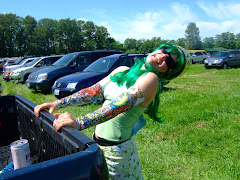 households maintained by fictional polygamist Bill Henrickson, who practices the "Principle" of plural marriage with his three wives, Margene, Nicky, and Barb. If there's drama in a regular marriage, it's obviously multiplied when numerous women share the same man, which is part of what make Big Love so doable--the storylines that arise from the multiple marriages are only one layer of the drama. Religious in-fighting, secrecy, and loads of other potential problems await the characters and lend themselves to endless plotlines.
households maintained by fictional polygamist Bill Henrickson, who practices the "Principle" of plural marriage with his three wives, Margene, Nicky, and Barb. If there's drama in a regular marriage, it's obviously multiplied when numerous women share the same man, which is part of what make Big Love so doable--the storylines that arise from the multiple marriages are only one layer of the drama. Religious in-fighting, secrecy, and loads of other potential problems await the characters and lend themselves to endless plotlines. The same is true in Brady Udall's novel The Lonely Polygamist--Golden Richards, a man with four wives and twenty-eight children, struggles financially and morally to keep his life from falling apart. Away from his homes on a construction job, he meets and falls in love with a quiet, child-free woman who offers him respite from the complications of his marriages and children, but that relationship (like all of them) does less to alleviate his frustrations than it does increase them--and given who the woman is married to, Golden's love for her puts his family in jeopardy. His liaison with her puts him not only in moral peril, but physical danger.
But his family is falling apart anyway. His most fragile wife, Rose-of-Sharon, has recently been hospitalized with a nervous breakdown; his first wife Beverly fights constantly to maintain her control over the household and the other women, and his fourth wife, Trish, finds herself alone and lonely during Golden's absences, and contemplates a tryst of her own. The most endearing character in the book is the one whose problems also spiral out of control and yet also lead to the resolution--however heartbreaking--of this amazing book. Eleven-year-old Rusty reminded me of the character in "The Ransom of Red Chief." Neglected amidst the chaos of his home, Rusty seeks entertainment wherever he can, primarily by sneaking out of the house and riding his bike around town and plotting ways to get his father to pay more attention to him. Unfortunately, in this regard, he eventually succeeds.
Polygamy? Not a fan. It's unfair to women and children, complicated, and disastrous in terms of the long-term well-being of families (what happens if the sole provider dies?) Besides the major issues, it's impractical and likely to be unmanageable and miserable on a daily basis. Regardless, watching Big Love and reading The Lonely Polygamist (even though they are fictional) gives me a little more understanding of how and why people choose this lifestyle. "...this after all, was the basic truth they all chose to live by: that love was no infinite commodity. That it was not subject to the cruel reckoning of addition and subtraction, that to give to one did not necessarily mean to take from another; that the heart, in its infinite capacity could open itself to all who would enter, like a house with windows and doors thrown wide, like the heart of God itself, vast and accommodating and holy, a mansion of rooms without number, full of multitudes without end."
This is the best novel I've read in 2010--multi-layered, often very funny, beautifully written, and insightful. No matter how many people you live with or love, there is likely to be a piece of your truth in these pages, and even if there isn't, Golden's story of the perpetual quest to define to define oneself internally and to the world at large is unforgettable.







